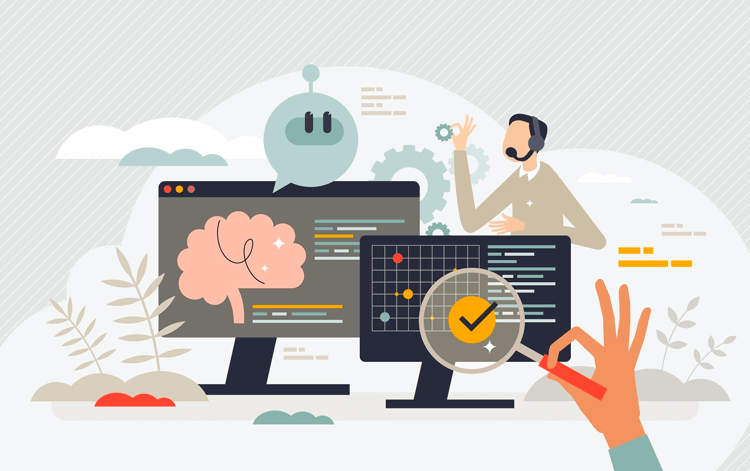AI-powered ticketing systems are changing how businesses handle customer questions and problems. These smart systems can sort, answer, and track customer issues much faster than manual methods.
Companies like Kodif are leading this change, and you can know more about how these systems work by seeing them in action.
Customer service teams using AI ticketing can solve problems faster and make customers happier. The technology works behind the scenes to make support smoother while keeping the human touch that customers value.
How AI Ticketing Systems Work
According to studies, over 6 in 10 customer support professionals consider that AI can help them in providing better customer support.
AI ticketing systems use smart technology to handle customer support tickets. They read incoming messages and understand what customers are asking for.
These systems can group similar questions together and send them to the right team members. This makes sure experts handle specific problems.
The AI gets smarter over time by learning from past tickets and solutions. It notices patterns and builds a knowledge base of common issues and fixes.
Most systems can:
- Sort tickets by topic, urgency, and complexity.
- Suggest answers based on similar past tickets.
- Send automatic replies for common questions.
- Track ticket status from start to finish.
- Spot trends in customer problems.
Benefits For Support Teams
Support agents spend less time on routine tasks with AI help. The system handles sorting tickets and finding basic information.
This gives agents more time to focus on complex problems that need human thinking. They can give better service to customers with tricky issues.
Teams can handle more tickets without getting overwhelmed. The AI takes care of simple questions while agents work on harder ones.
Agent training becomes easier with AI systems. New team members can see suggested answers and learn how to handle different issues.
The stress level goes down for support teams. They don’t face a wall of unsorted tickets each morning, and they get AI help with finding solutions.
Benefits For Customers
Customers get faster answers with AI ticketing. Simple questions often get immediate automatic replies.
Even complex issues get solved quicker because agents have more time and better tools. The AI helps find solutions from past similar cases.
Support becomes available 24/7 for basic questions. The AI can answer common questions even when human agents are off duty.
Customers don’t have to repeat information when talking to different agents. The AI keeps track of the full conversation history.
The overall experience feels more personal because agents have time to focus on the customer instead of searching for information.
| Without AI Ticketing | With AI Ticketing |
| Manual sorting of tickets | Automatic sorting by topic and priority |
| Agents search for answers | AI suggests solutions based on history |
| Long wait times | Faster responses |
| Limited service hours | 24/7 basic support |
| Repeated information | Complete conversation history |
Key Features To Look For
Automatic ticket routing sends questions to the right team or person without human help. This cuts down on transfer time.
Smart suggestions give agents possible answers based on the ticket content. This helps them respond faster.
Sentiment analysis spots upset customers who need special attention. The system can flag these tickets for priority handling.
Multi-language support helps global businesses serve customers in their own language. The AI can translate or route to agents who speak that language.
Self-service options let customers find answers without creating a ticket. The AI can guide them to help articles or walk them through simple fixes.
Integration with other tools connects the ticketing system to your CRM, chat, and phone systems. This creates a complete view of each customer.
Setting Up An AI Ticketing System
- Start by listing your most common customer questions and problems. This helps the AI learn what to expect.
- Pick a system that fits your current tools and workflows. The right AI should make things easier, not force big changes.
- Begin with a test group of agents and customers. This lets you work out problems before rolling out to everyone.
- Train your team on how to work with the AI assistant. They need to know how to use its suggestions and when to override them.
- Set clear goals for what you want to improve. You might focus on faster response times, higher customer satisfaction, or reducing agent workload.
- Collect feedback from both customers and agents during the early days. This helps you adjust settings and fix any issues.
Common Challenges And Solutions
Some customers worry about talking to robots instead of people. The solution is clear communication about when they’re interacting with AI versus humans.
Agents might feel threatened by automation. Address this by showing how AI handles boring tasks and lets them focus on more rewarding work.
Setting up the system takes time and effort at first. Plan for this learning period and don’t expect perfect results immediately.
The AI might misunderstand complex or unusual questions. Create a smooth handoff process to human agents when this happens.
Keeping knowledge up to date requires regular attention. Assign someone to review and update the information the AI uses to answer questions.
Planning Your AI Ticketing Strategy
Look at your current customer service metrics to find pain points. Target these areas first with your AI system.
Consider starting with internal tickets before customer-facing ones. This lets your team practice with the technology.
Plan for a mix of AI and human support based on ticket complexity. Simple questions can be automated while complex ones go to humans.
Build in review processes to check AI performance. Regular audits help catch and fix any problems in the system.
Create clear policies about data privacy and security. Customers need to know their information is protected in the AI system.
Final Thoughts
AI ticketing systems have changed what’s possible in customer support. They allow small teams to handle large volumes of questions while keeping service quality high. The technology continues to improve, making support faster and more accurate.
The best approach combines AI efficiency with human judgment. Machines excel at processing information and finding patterns, while people bring empathy and creative problem-solving. Together, they create support experiences that keep customers coming back.
As you consider adding AI tools to your support process, focus on the customer experience first. The goal isn’t just to save time or money, but to create better, faster help for the people who use your products or services. With the right system and team training, AI ticketing can lift your customer service to new heights.







